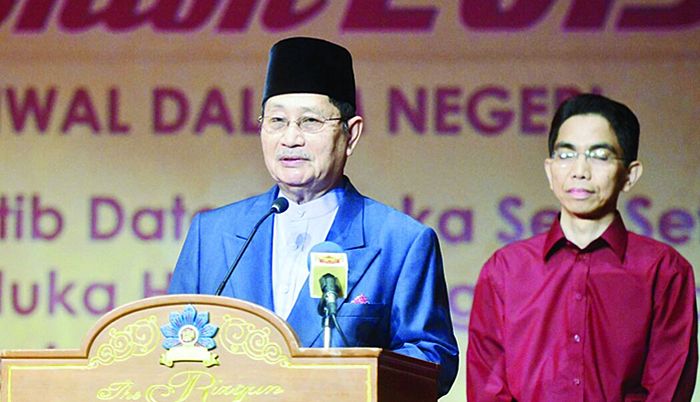
Minister of Home Affairs Yang Berhormat Pehin Udana Khatib Dato Paduka Seri Setia Ustaz Haji Awang Badaruddin bin Pengarah Dato Paduka Haji Awang Othman delivering his remarks. | PHOTO: COURTESY OF PELITA BRUNEI (Zul-Izzi Haji Duraman)
GADONG, BANDAR SERI BEGAWAN: The implementation of a policy revoking unused foreign labour quotas has helped create more employment opportunities for locals, the Minister of Home Affairs said, ©BRUDIRECT.COM reported.
At the same time, new business licensing procedures have led to an increase in the number of companies, Pehin Udana Khatib Dato Paduka Seri Setia Ustaz Haji Awang Badaruddin bin Pengarah Dato Paduka Haji Awang Othman, said while delivering a speech as the guest of honour at the Appreciation Night for Exemplary Employees and Employers at The Rizqun International Hotel yesterday.
“In the period of one year, from July 2014 to June 2015, as many as 10,772 quotas belonging to 2,055 companies have been cut,” he said.
“So far 123 companies have forwarded their appeals to regain 962 of their cut quotas (but) only 234 quotas have been approved.”
The positive effect of this policy, he said, can be seen from the decrease in jobseekers for May 2015, which was recorded by the Department of Economic Planning and Development from 13,584 to the 15,081 jobseekers in March this year.
“The policy of cutting unused quota and its prudent implementation have improved the response and cooperation of employers to hire local employees to work in their companies,” the minister said.
This, he said, is evidenced by the job vacancies advertised by companies through the Local Employment and Workforce Development Agency (APTK), which have increased by five times from 512 openings in the first six months of last year, before the new policy was introduced, to 2,854 openings in the latter six months of last year, after the policy’s introduction.
“We are confident that the policy of foreign worker recruitment that is being carried out prudently is appropriate to reduce the number of unemployed with the active participation of companies in prioritising employment opportunities for locals.”
The Ministry of Home Affairs and the relevant departments, particularly the APTK will actively monitor the recruitment of foreign workers taking into consideration the development of the private sector, the minister said.
This active monitoring, he added, is towards the implementation of a foreign worker recruitment policy that is in accordance with real needs so that the quota of recruiting employees and their licences are for the business purposes that are truly needed by the country.
The minister highlighted that the worker quota/licence is “not a channel to bring in cheap labour”. These foreign workers become freelancers or take up local employment opportunities, he added.
The quota and licence are also “not to be used as a way of bringing in individuals to try their luck in becoming small entrepreneurs by using the goodwill and services of locals as `partners’.” Such methods, he said, are generally known to make locals partners become ‘facilitators’ and end the opportunities of local people to take an active part in a growing business.
“The main objective of the policy is to ensure that the arrival of foreign workers in our country is in a number and size. that is controlled and secure in terms of population,” he said.
“Because of that, unused quotas that were given to companies to bring in 71,282 foreign workers were cut last year,” he said.
“The implementation of policy and achievement of this objective is done prudently,” he added.
The ministry, he said, has created guidelines for its implementation, including the establishment of a special committee to consider the appeals of companies affected by the cutting of the quota.
He said the ministry and APTK will continue to improve their quality of service.
Sharing an example, he said that in line with pro-business policies to support enterprises and local participation in the business ventures, the Labour Department has been asked to take the initiative to introduce special approval for recruiting foreign workers for new companies that have been registered and issued a business license in accordance to a new procedure in the policy in order to facilitate starting a business, which was introduced on January 5 this year.
“The change that is very significant in this regard is in the amount of time it takes to attain approval to hire new foreign workers which is now only seven days, compared to the normal period in accordance with TPOR (Tekad Pemedulian Orang Ramai) which is 21 working days.”
“So this initiative is to help those instantly-licensed companies to begin operations quickly,” he said. “The new licensing procedure has also proven to help accelerate the growth of companies.”
He shared that 1,777 business licences were issued in a period of 12 months last year before the new procedure was introduced. In contrast, in a period of seven months since the new procedure was introduced (January-July) this year, 1,756 business licences have already been issued. He said that it is expected that the number will reach 2,000 by the end of the year.
He also mentioned the introduction of the Labour Control System (LCS) and Electronic Labour Exchange (ELX) that are currently being launched in stages to enhance the quality of service.
